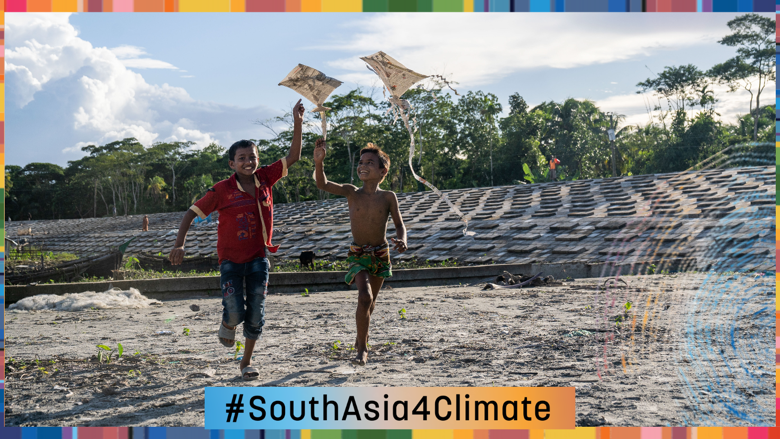 Photo: World Bank
Photo: World Bank
South Asia sits precariously on the front lines of the global climate crisis. As temperatures increase, the region – which is experiencing a ‘new climate normal’ – is predicted to see hotter weather, longer monsoon seasons, and increased droughts. The region’s extreme vulnerability has long been apparent. More than half of all South Asians, or 750 million people in eight countries have been affected by one or more climate-related disasters in the last two decades.
The effects are far-reaching and devastating. In Afghanistan, farmers face a second year of climate-induced drought, its worst in decades, at a time when nearly 19 million Afghanis are unable to feed themselves. In 2020, tropical Cyclone Amphan, one of the strongest cyclones ever recorded, displaced nearly five million people across India and Bangladesh.
In the coastal states of Bangladesh, India and Sri Lanka, rising sea levels, flash flooding and powerful cyclones pummel the coastline with increasing frequency. Temperatures and droughts are intensifying across the mountainous ranges of Afghanistan, Bhutan and Nepal. Given the current rates of global warming, the tiny archipelago nation of the Maldives in the Indian Ocean, the smallest country in the region, may be submerged in the not-too-distant future.
The COVID-19 pandemic has also hit the region hard - weakening economies and disrupting agricultural activities. As South Asia emerges from the pandemic and its accompanying recession, urgency, momentum, and opportunity for climate action coincide.
As part of our new climate series on South Asia, #SouthAsia4Climate, we will highlight solutions, innovations, investments that have made a real difference in the lives of people and communities. South Asia is pioneering many climate-smart solutions, including innovative community approaches to coastal resilience, scaling up renewable energy, and regenerative forestry. Accelerating and scaling up these efforts is critical to building resilience to the rapidly warming climate in the region and reducing emissions.
This is why the World Bank Group (WBG) has launched the South Asia Climate Change Roadmap to boost climate action at the country level. This plan lays out how the WBG will support climate action in the region – both mitigation and adaptation efforts – over the next five years.
It offers concrete steps to help the region accelerate a climate-smart transition in three key areas that will be critical to building resilience to the rapidly warming climate in the region. Firstly, that means supporting agriculture, food, water and land transitions in a climate-smart way. Secondly, decarbonizing the energy sector – while ensuring universal access to electricity. And thirdly, it means supporting the growth of low-carbon and climate resilient cities.
In the coastal states of Bangladesh, India and Sri Lanka, rising sea levels, flash flooding and powerful cyclones pummel the coastline with increasing frequency.
What does that look like in practice?
In the past fifty years, Bangladesh – one of the world’s most densely populated countries – has become a world leader in coastal resilience and an inspiration for other climate-vulnerable nations. Thanks to decades of systemic investments in climate resilience, Bangladesh has married impressive economic growth with savvy cyclone preparedness to reduce its storm casualty rate by a hundred-fold. With WBG support, Bangladesh has rehabilitated over 700 kilometers of vulnerable sea embankments to safeguard against storm and tidal surges and helped construct and rehabilitate over 1,000 cyclone shelters and 550 kilometers of access roads.
In Colombo, the capital of Sri Lanka, the city’s wetlands - after years of neglect and encroachment - are being conserved and revitalized as a nature-based solution to prevent flooding. For nearly a decade, the WBG supported Metro Colombo Urban Development project (MCUDP) has combined engineering and environmental science to implement flood mitigation, urban upgrading and wetland conservation. The goal of the project is not just to prevent future flooding by introducing hard infrastructure, but to reposition urban parks and the wetlands as the beating heart of city life.
In 2018, in the tropical Indian state of Kerala, a deadly flood following an unusually high monsoon rainfall killed 500 people, impacted almost 5.4 million more and devastated the state’s economy. Implemented in 2021, the Resilient Kerala Program will help Kerala enhance its capacity to deal with potential shocks -- natural disasters, climate change impacts, disease outbreaks and pandemics – by mainstreaming climate and disaster risks into planning and investment processes. This means incorporating disaster risk planning into the master plans of urban and local self-governments and helping make the health, water resources management, agriculture, and road sectors more resilient to calamities.
Delivering climate action across South Asia will require strengthening the resilience of targeted systems combined with a robust financial system that can fund climate-smart transitions . That means helping our partners across the region to green the financial sector, scale up public and private finance by making climate central to financial decisions, and translate strategies into real-time investment plans.
We invite you to join us to discover how countries on the front lines of climate change across South Asia are paving the way for a more equitable, prosperous and cleaner future. Over the coming months we will publish more stories from South Asia on our new World Bank South Asia climate webpage that illustrate opportunities and solutions to boost climate action and accelerate climate-smart transition.
Follow the conversation: #SouthAsia4Climate



Join the Conversation